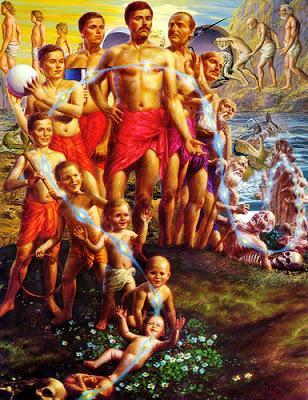
Image by new 1Illuminati.
"Gerotranscendence" refers to a theory of aging that is loosely related to Eastern mysticism and New Age philosophy.Gerotranscendence views the proper task of late life as this: finding life satisfaction in realms beyond material experience.
As with other transcendental aka spiritual theories, a gerotranscendent state does not reside in physical attractiveness, strength, fame, material possessions or political power. Happiness is grounded in accepting the self, others, and the world at large in a way that transcends mortal limitations.
Swedish sociologist Lars Tornstam developed this theory in a series of scholarly papers published throughout the 1980s and 1990s and culminating in his book, Gerotranscendence: A Development Theory of Positive Aging. (2005)
Building on the work of Carl Jung and Erik Erikson, Tornstam interviewed older adults themselves, looking for an emerging theory of aging from their perspective.
In the introduction to his book, Tornstam fears that midlife researchers project too much of their own bias towards activity, productivity, and achievement onto older adults and thereby view them as failing when they are merely in a different life stage.
Tornstam suggests, "Instead of accepting the hidden assumption that good aging is the same as continuing the midlife pattern indefinitely, we suggest that growing old has its very own meaning and character" (Gerotranscendence, p. 3).
His theory is quite extensive and deserves close attention. If you are not able to read his book or scholarly articles, here are some key points:
- A more holistic view of time with the past, present and future sometimes merging together.
- A rejection of relationships, possessions and activities judged as shallow or superficial.
- More living in the moment and increased playfulness.
- A rejection of absolutes and a greater acceptance of relativism.
- A diminished concern for the vanities of the body beyond meeting basic needs.
- An enjoyment of solitude and reflection.
- A keen understanding between the difference between core self and social role.
If you are interested in the history of ideas and would like to read a critique of Tornstam's work, you might find this article of interest.
I have to confess my awkwardness in writing about gerotranscendence. I can see that many of my age mates and I favor a view of aging that is productive, active, and achievement oriented. Often, I am indeed projecting the strength of midlife into late life--specifically, my late life. I still have a teen and a tween at home. Being an older parent probably encourages my midlife choke-hold on maintaining my core "Self" as productive for as long as possible.
Currently, I'm in my 50s. After reading about gerotranscendence, I am now interested to see if I end up shedding my view of aging as an act of "doing" and adopting a view that aging is a state of "being." Check the blog in 30 years and see how I'm spinning things by then. And if I'm not publishing posts when you check back, go to the river and look for me there.

Photo by nandadeviest.
Related:What Theory Do You Use to Describe Aging? Robert G. Peck's Tasks for Older Adults Coping with Illness

